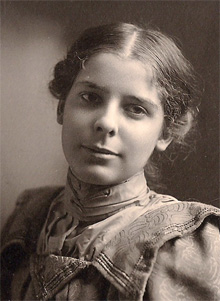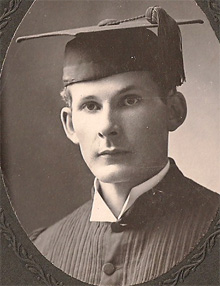I would like to share an article about Abraham Lincoln written by my great uncle Diedrich C. Ahlers in 1899 when he was attending Dixon College in Dixon, Illinois. It was published in The College Meteor in February, 1899, a few months before he graduated from the classic course. He was born in 1873 on his family's farm two miles north and a half mile east of the Minonk Cemetery corner in Groveland Township, La Salle County. The farm has continuously been in the Ahlers-Oncken family since 1867. Diedrich's parents Henry and Bertha Ahlers had seven children including Louis, Robert, my grandmother Mary Ahlers Oncken, Emma Ahlers Hielscher, Diedrich, Anna and Martha. All seven children attended the local Dewey School.  Martha was a first year student at Dixon College in 1899 when she became sick with cerebral meningitis and died at the age of 17 1/2. An article telling of her illness and death appeared in the same college paper as her brother's article on Abraham Lincoln.- Jari Lynn Oncken
Martha was a first year student at Dixon College in 1899 when she became sick with cerebral meningitis and died at the age of 17 1/2. An article telling of her illness and death appeared in the same college paper as her brother's article on Abraham Lincoln.- Jari Lynn Oncken

Just ninety years ago, on the prairies of the Blue Grass State, Abraham Lincoln was born. Nothing in his early life indicated the influence he was to exert on the character of our nation, but at the time he was nearing manhood our country was approaching the most critical period of her existence. About two hundred years before this the first seeds of slavery had been sown. By lapse of time it became an institution wonderful in power and proportions, far-reaching and corrupt in its influence and the bone of many a political contention in our halls of congress. It first gave evidence of its real character when in 1820 the Missouri Compromise occupied the attention of the nation. The abolition party had now become a recognized factor in American politics. Its avowed object was to root out slavery, because it threatened the very institutions of government bought with patriotic blood at Lexington and Saratoga, because it sought to destroy the equality of man, the underlying principles of our constitution, recognized throughout the world as the grandest document ever conceived by mortal man, because it was a great ulcer on the body politic, fed by race prejudices, sectionalism, and fanaticism.
Their opponents on the other hand argued that the constitution recognized and protected slavery where it existed, that it was an infringement on the rights of the states to abolish it, and a breach of the public faith. But they were met with the bold declaration that agitation would be continued until slavery or the Union was destroyed, and that they would not live under a flag that protected such an institution, and which one of their leaders declared was but a "covenant with death and an agreement with hell." The compromise was passed but it gave the country but a momentary respite. The fire was slowly smothering, only to break out with greater fury. The breach between North and South was widening more as time went on. The seed of the great struggle had been sown. The result was inevitable. The voice of reason was drowned in the storm of passionate excitement which swept over the land. Conservatism and sober thought gave way to wildest frenzy. The extremists on both sides were taking every advantage to prosecute their unpatriotic schemes.
During these internal dissensions and scenes of political upheaval, young Lincoln was taking an active part in the politics of his state, and as senator engaged Douglas in a series of remarkable debates. His sincere devotion to a cause he deemed more sacred that life, his great intellectual vigor, and his sincerity, born of conviction, brought him prominently before the people and led to his election as president. Never was fitter or abler man clothed with the executive power of a nation sprung from the ranks of the yeomanry of his land, he never proved false to them. He recognized the hand of God in history and knew that his opponents were but jostling the divine order of the universe. He saw that the spirit of his generation would not allow one man the right of property in another, and that they would vindicate with their blood the opening clause of the Declaration of Independence, affirming the equality of man. Kind-hearted, and a lover of peace, he did everything to avoid what might precipitate the impending strife, but was determined to execute the laws and to hold public property seized by the seceded states.
But what could not be adjusted by the debate of the forum must be settled by an appeal to arms, for when the opening gun was fired from a confederate battery at Fort Sumter, with a resolute purpose he awaited the inevitable conflict. This bombardment put an end to the hope of a peaceful settlement, and calling for volunteers he faithfully applied himself to the discharge of his duties as commander-in-chief. The opening battles gave very little encouragement to the North, but finally a decisive blow was struck at Gettysburg, which put an end forever to Northern invasion, and was the great turning point in the war. Here a most pathetic event took place a few months after the battle, when the great war president spoke those memorable words dedicating the sacred field as a national cemetery. The death-knell of slavery had already been sounded by the immortal proclamation. The country was in the midst of the fiercest struggle in modern history. The news of many reverses on the battle-field made it a time of intense excitement. The "House divided against itself" seemed about to fall. Nearly every family altar in the land was crimsoned with the blood of the dead and dying.
A million hearts prayed for success to Southern arms. An equal number prayed to God for the preservation of the Union. The heart of the noble man was almost torn with the gloomy prospect. Pale, careworn, hard by the graves of 10,000 Union dead, he arose to speak to the persons there assembled. He pleaded with his people to dedicate their lives anew, to firmly resolve that the blood of the boys in blue, which had hallowed that spot a short time before, shall not have been shed in vain. He urged in appeal more eloquent than pen can portray, that the nation have a new birth of freedom, and that those underlying principles of liberty for which thousands of brave patriots had sacrificed their lives at Bunker Hill and Valley Forge, for which Patrick Henry had spoken in the Virginia Convention, for which Washington, Jefferson and Jackson had contended, shall not perish from the earth.
Then follows the closing scenes of the civil strife, the last year's struggle, the closing battles of the war, the awful loss of human life, the ultimate success of Union arms, Appomattox, the glorious consummation of a righteous cause, the will of God in history.
The race of his earthly career was run. He had done his duty and was ready for the divine benediction. On Good Friday, the day when the Savior of mankind was nailed to the cross on Calvary, he was assassinated while in the theatre, and the great emancipator became a martyr to the cause of liberty. Lingering until the next morning the voice that spoke "Malice to none and charity to all," was hushed in eternal silence, and the noblest product of American civilization was laid away, while a grief-stricken nation wept.
It has been truly said that a nation's glory consists in her great men. Washington wrought American independence, but it was left to Lincoln to establish American manhood. The great apostle of a new political creed clearly saw that his mission on earth was to preserve what the patriots of the revolution had created. The cares of the nation weighed heavily on him.
Once when receiving news of Northern defeats, with an expression of anguish on his furrowed face, he declared that he would willingly exchange places with the soldier who sleeps on the ground in the Army of the Potomac. A modest unassuming youth from the banks of the Ohio became the liberator of four million persons in the bondage of slavery, became a ruler who helped demonstrate that a government resting on popular will is strong enough to endure. A rail-splitter on the Western prairies became the idol of a free people, whose institutions he preserved and whose honor and glory were dearer to him than his life. Humanity will cherish his memory as long as popular government endures, and a grateful republic will lift its voice in praise and thanksgiving to the God of Nations, "who doeth all things well." - D. C. Ahlers.